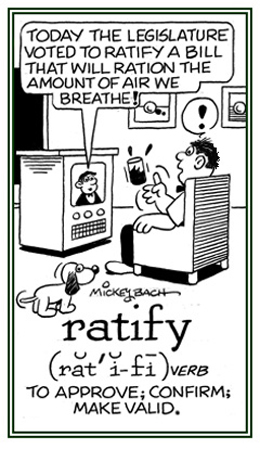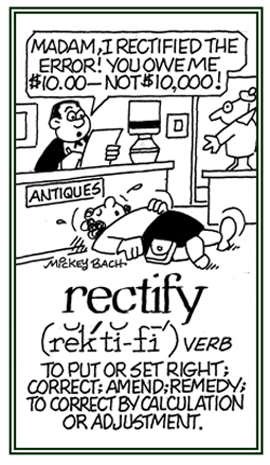-fy
(Latin: a suffix; make, do, build, cause, produce)
pacify (verb), pacifies; pacified pacifying
1. To soothe anger or agitation; synonyms: mollify, conciliate, appease, placate.
2. To subdue by armed action; reducing to a state of submission; especially, by military force; subduing.
3. To fight violence and to make efforts to establish peace in an area.
4. Bringing or restoring to a state of peace or tranquility; encouraging quiet; making calm: "She made every effort at pacifying the angry man."
5. Appeasing; such as, pacifying one's appetite.
2. To subdue by armed action; reducing to a state of submission; especially, by military force; subduing.
3. To fight violence and to make efforts to establish peace in an area.
4. Bringing or restoring to a state of peace or tranquility; encouraging quiet; making calm: "She made every effort at pacifying the angry man."
5. Appeasing; such as, pacifying one's appetite.
Unhappy babies are often given a rubber device for sucking called a pacifier to stop their crying. In the same way, someone stirred up by anger or some other strong emotion can usually be pacified by resolving or removing its causes.
In a usage that refers to a military combat area, it means using armed forces to neutralize the enemy there and to quiet the local people who may have been supporting them.
personify (verb), personifies; personified; personifing
To present a particular quality in the form of a person: Sue personifies beauty and kindness with whomever she meets.
petrify (verb), petrifies; petrified; petrifying
1. To convert or to change something into rocky substances: In order to petrify wood, there needs to be an environment without oxygen, but with minerals, which then fill the cells of the tree and convert it into a very hard material, such as a stone.
2. To paralyze someone with astonishment, horror, or another strong emotional situation that makes someone rigid or unable to move: Jack was totally petrified and speechless when he lost his job and his wife at the same time.
2. To paralyze someone with astonishment, horror, or another strong emotional situation that makes someone rigid or unable to move: Jack was totally petrified and speechless when he lost his job and his wife at the same time.
pinguefy
1. To become or to make fat or greasy.
2. To make greasy or to saturate with oil.
3. To make rich.
2. To make greasy or to saturate with oil.
3. To make rich.
planify
1. To plan in great detail.
2. To produce a plan, or plans, explicitly and with precision.
2. To produce a plan, or plans, explicitly and with precision.
purify (verb), purifies; purified; purifying
1. To cleanse, refine, decontaminate: There are botanists who say trees help to purify the air.
2. To redeem or to sanctify. Priests usually purify themselves before religious ceremonies.
2. To redeem or to sanctify. Priests usually purify themselves before religious ceremonies.
putrefy, putrefies
1. To make putrid, rotten, and foul.
2. To undergo putrefaction or decomposition.
3. To be broken down by bacterial action and so, to decay, producing a strong, unpleasant smell.
2. To undergo putrefaction or decomposition.
3. To be broken down by bacterial action and so, to decay, producing a strong, unpleasant smell.
qualify
quantify
1. To determine the quantity of; to calculate or express the number, degree, or amount of something.
2. To use a quantifier to limit the range of individuals or items referred to in a sentence or proposition.
2. To use a quantifier to limit the range of individuals or items referred to in a sentence or proposition.
ramify (verb), ramifies; ramified, ramifying
1. To have complicating consequences or outgrowths.
2. To divide into or cause to extend into divisions or subordinate branchlike parts.
3. Of trees and plants or their parts; to form branches, to diverge out, to extend in the form of branches.
4. To extend or to spread into a number of subdivisions or offshoots analogous to branches; especially in the anatomy of veins, nerves, etc.
2. To divide into or cause to extend into divisions or subordinate branchlike parts.
3. Of trees and plants or their parts; to form branches, to diverge out, to extend in the form of branches.
4. To extend or to spread into a number of subdivisions or offshoots analogous to branches; especially in the anatomy of veins, nerves, etc.
rarefy
1. To make less dense.
2. To increase the porosity, or small openings, of something.
2. To increase the porosity, or small openings, of something.
ratify (verb), ratifies; ratified, ratifying
1. To make something officially valid or to give formal approval or consent by voting for it or signing it: Several countries will ratify a treaty in the upcoming week and it is scheduled to go into effect the following month.
2. Etymology: from Latin ratificare, "to confirm, to approve."

© ALL rights are reserved.
Go to this Word A Day Revisited Index
2. Etymology: from Latin ratificare, "to confirm, to approve."

Go to this Word A Day Revisited Index
so you can see more Mickey Bach illustrations.
reclassify
rectify (REK tuh figh") (verb), rectifies; rectified; rectifying
To make something accurate and correct or proper and respectable: The saleslady amended, or rectified, the amount Eddie had to pay for the antique vase because she had charged too much for it.

© ALL rights are reserved.
Go to this Word A Day Revisited Index

Go to this Word A Day Revisited Index
so you can see more of Mickey Bach's cartoons.
resolidify


